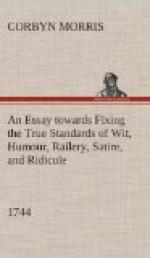Although there is little surviving evidence of Morris’s purely literary interests, a set of verses combining his economic and artistic views appeared in a late edition of The New Foundling Hospital for Wit (new edition, 1784, VI, 95). Occasioned by seeing Bowood in Wiltshire, the home of the Earl of Shelburne, the lines are entitled: “On Reading Dr. Goldsmith’s Poem, the Deserted Village.”
This was the man who at the age of thirty-three brought out An Essay towards Fixing the True Standards of Wit, Humour, Raillery, Satire, and Ridicule. That it was ever widely read we have no evidence, but at least a number of men of wit and judgment found it interesting. Horace Walpole included it in a packet of “the only new books at all worth reading” sent to Horace Mann, but the fulsome dedication to the elder Walpole undoubtedly had something to do with this recommendation. More disinterested approval is shown in a letter printed in the Daily Advertiser for 31 May 1744. Better than any modern critique the letter illustrates the contemporary reaction to the Essay.
Christ Church College, Oxford,
SIR:
I have examin’d the Essay you have sent me for fixing the true Standards of Wit, Humour, &c. and cannot perceive upon what pretence the Definitions, as you tell me, are censured for Obscurity, even by Gentlemen of Abilities, and such as in other Parts of the Work very frankly allow it’s Merit: the Definition of Wit, which presents itself at first, you say is, particularly objected to, as dark and involv’d; in answer to which I beg Leave to give you my plain Sentiments upon it, and which I apprehend should naturally occur to every Reader: In treating upon Wit, the Author seems constantly to carry in his View a Distinction between This and Vivacity: there is a Lustre or Brilliancy which often results from wild unprovok’d Sallies of Fancy; but such unexpected Objects, which serve not to elucidate each other, discover only a Flow of Spirits, or rambling Vivacity; whereas, says he, Wit is the Lustre which results from the quick Elucidation of one Subject, by the just and unexpected Arrangement of it with another Subject.—To constitute Wit, there must not only arise a Lustre from the quick Arrangement together of two Subjects, but the new Subject must be naturally introduced, and also serve to elucidate the original one: the Word Elucidation, though it be not new, is elegant, and very happily applied in this Definition; yet I have seen some old Gentlemen here stumble at it, and have found it difficult to persuade them to advance farther:—I have also heard Objections made to the Words Lustre and Brilliancy of Ideas, though they are Terms which have been used by the Greeks and Romans, and by elegant Writers of all Ages and Nations; and the Effect which they express, is perfectly conceiv’d




